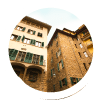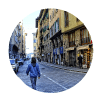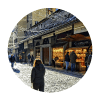Do’s and Dont ’s
A few suggestions that may make
your stay in Italy more enjoyable
Do remember that you are in Italy to experience la Dolce Vita - Italian lifestyle. Do not
assume that laws, regulations, habits or customs are the same as at home. Become an
observer, watch what Italians do so you know what to expect and what is expected.
Enjoy the diversity and have a life changing adventure !

DON’T bring bulky electrical appliances.
Italy is a modern country and all the basic items you may need can be found here from toiletries to regular household supplies. You will probably find yourself doing a bit of shopping for pleasure as much as necessity anyway

DON’T bring bulky electrical appliances.
Most Italian houses have a 3 kw/h power supply that works with international power adaptors. Remember that an adaptor is essential for charging cell phones, laptops, etc. These can easily be bought in Italy, along with any other appliances you might want such as hairdryers or irons.

DON’T forget that while Italy has a low violent crime rate, pickpocketing is common.
Mind your surroundings, particularly in large crowds/tourist areas and keep your valuables close or leave them at home. Women should always have a hand on their purse; for example never hang your purse over the back of a chair where you can’t see it. Making a habit of these practices will prevent the hassle of trying to recover stolen money and documents.

DON’T expect everyone to speak English.
While many Italians learn a bit of English in school, that does not mean they speak or read it regularly. Making the effort to learn some basic Italian to help you get around and communicate can go a long way. Italians are usually very friendly and helpful when they are approached with politeness, so always remember Per favore and Grazie! There are multiple apps for your phone or tablet that can help you build up vocabulary and grammar skills on the go.

DON’T buy or rent a car unless you live on the outskirts of town.
Traffic in Florence is strictly regulated, parking is expensive and hard to find, and the public transportation is good. Riding a bicycle, taking a bus, or walking is the preferred mode of Florentines. Taxis can be called in those cases when needed by dialing 055 4242 and giving the address where you want to be picked up.
IF you really need or prefer to have a car:
The traffic zone encompassing the whole historical center
of Florence is called the ZTL (Zona a Traffico Limitato or
Limited Traffic Zone) and during most hours only cars with
special permits are allowed to drive and park in this area.
These rules are strictly enforced and the roads are under
surveillance; Milligan & Milligan is not responsible for any
traffic fines that guests incur during their stay.
In the city center all year it is not possible to Drive or Park:
between 7:30am and 8 pm Monday thru Friday ad well as
Saturday 7:30 to 2pm.
● In the warmer months ( April to October approximately)
due to the movida the center is also closed to cars the
evenings of:
Thursday from 11pm to 3am
Friday from 8pm to 3am
Saturday from 4pm to 3 am
( so basically only a 2-4 pm window )
● The only exception is if you have reserved a garage, the
garage will whitelist your licence plate with the payment of
a car city tax of 1 euro every time you drive to the garage.
● We have an agreement with FIRPARKING with a cost per
day of €25 - 45 depending on the size of your car. Weekly
and monthly rates are also available.
● An alternative is to park off the Autostrada A1 at Villa
Costanza which has a daily rate of Euro 7 per day, 20 per
week or 40 per month. The tram runs directly from the
parking lot to the Central train station of Florence.

DO bring a comfortable pair of shoes.
Your feet will thank you after a long day spent sightseeing or just walking around town.

DO remember that in Italy there is a ground floor or piano terra or terreno, so the 1st floor is one flight up.
Most centrally located buildings in ancient cities like Florence, Pisa, Rome, Siena, and Venice , do not have elevators as they did not exist when the building was constructed!

DO keep in mind that Florence has a strange and unique street numbering system.
There are black numbers for residential buildings and red numbers (indicated as 1R for example) that are businesses. As over the centuries a building's use may have diversified there is often an incoherent mixture of black and red numbers.

DO bring any medications you may need during your stay.
Italian pharmacies (some of which are open 24 hours in the larger towns) will have most of the same medicines but with different names; if there are any necessary prescriptions you take, speak with your doctor about getting a supply for when you are abroad. Otherwise, it is smart to look up the Italian brand name before arrival in the event you need to buy something here.

DO bring activated credit cards.
Credit cards are widely used in Italy nowadays. You can easily identify which credit cards are accepted at various establishments and ATM machines (called ‘bancomat’ in Italy) by looking at the logos displayed. Milligan & Milligan accepts all payment by credit card, both online and in our office.
It is important to check with your bank in your home country prior to leaving to avoid any unpleasant surprises. Some banks will freeze your account to prevent ID theft when they see transactions coming from a new country, others have both a charge and commission fee on account withdrawals in different currency: in any case, it is best to be aware of the policies of your bank so your trip can go smoothly.

DO investigate your cell phone and wireless options.
Depending on how long you are staying in Italy, it can be advantageous to purchase a cheap Italian cell phone with a pay-as-you-go plan when you arrive. These can be recharged with prepaid cards that you buy at the phone store, and many tobacconists and supermarkets sell them as well. Remember that iPhones have to be unlocked for international use.
Skype and Facetime and Whatsapp are also practical ways to stay in touch, but internet connections are not always perfect. Many public places in Florence and other major cities have free Wifi areas, so it is good to familiarize yourself with these for when reception at home is not ideal. Phone stores such as Tim and Wind also have options for portable modems that can be recharged every month.

DO get information about visa requirements before entering Italy
Citizens of the U.S., Canada, and a few other non-EU countries entering Italy for reasons of tourism, study, or business do not need a visa for visits less than 90 days. For longer stays, there are several types of visa you can apply for such as business, study, family, independent work, and tourism. Check online or with the Italian Consulate in your country well in advance of your trip if you think you need a long-term visa so you can begin the process of collecting the necessary documents.

DO remember that businesses in Italy might have different hours than you are used to.
While supermarkets and other big stores might have
continuous hours, many other businesses close for lunch
for a few hours in the afternoon. Hours can also change
based on various religious and government holidays. Here
are the main ones:
1 January: New Year’s Day or Capodanno
6 January: Epiphany or Epifania
Easter Sunday or Pasqua: Changes every year
Easter Monday or Pasquetta: The day after Easter
25 April: Anniversary of Liberation or Festa della Liberazione
1 May: Labour Day or primo Maggio Festa dei Lavoratori
2 June: Republic Day or Festa della Repubblica
Mid-August or Ferragosto: Technically 15 August, but often
the entire week is a holiday
1 November: All Saints or Ognissanti/Tutti I santi
8 December: Immaculate Conception or Immacolata
Concezione
25 December: Christmas Day or Natale
26 December: St. Stephen’s Day or Santo Stefano



 Book
Book 